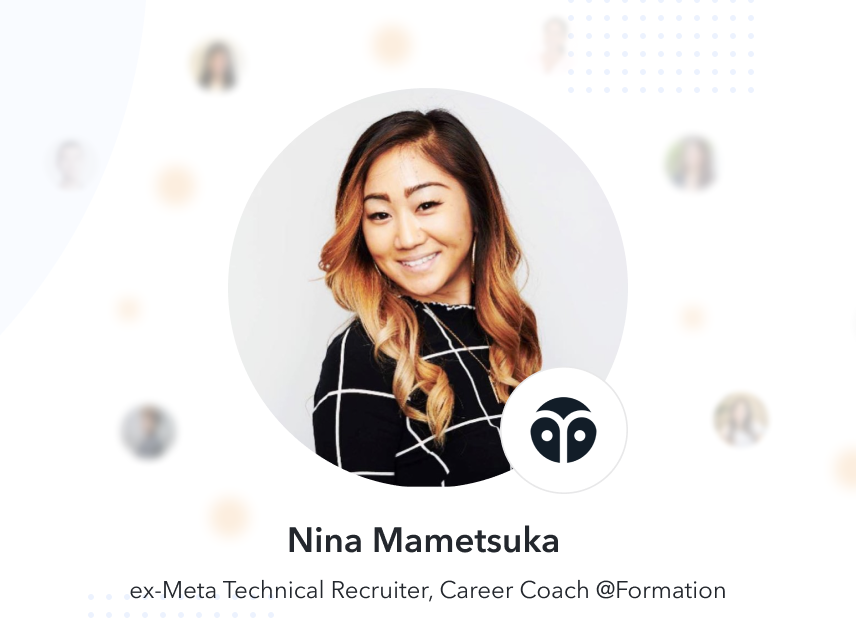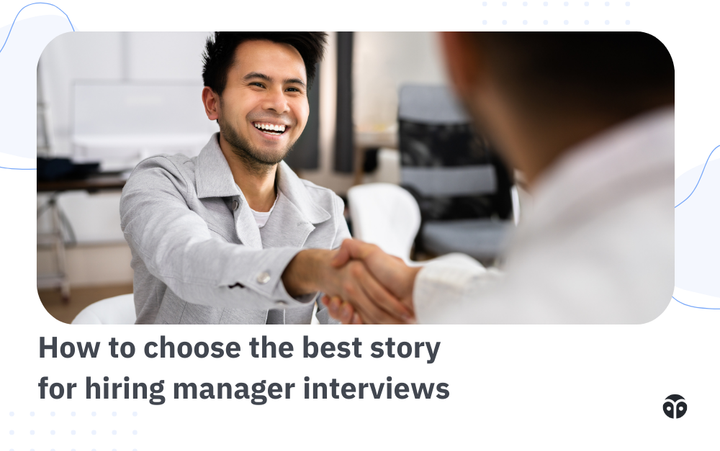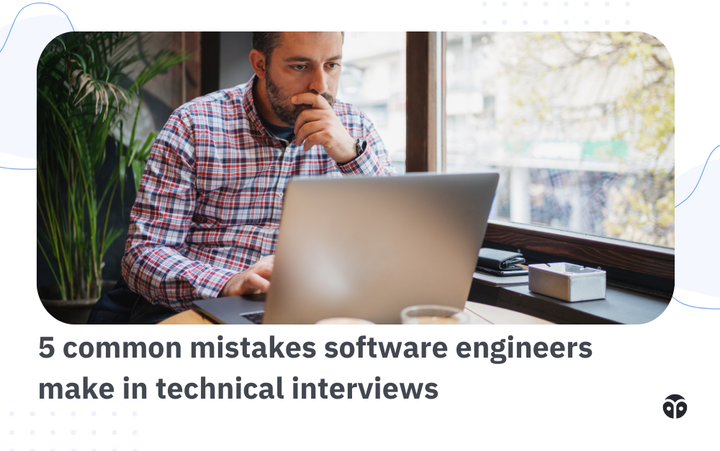5 Things to Avoid Doing in an Interview
Throughout my career in technical recruiting, I’ve seen just about everything. Here are the 5 things you should never do in an interview.

This blog post is part of a series designed to make navigating the current tech job market more approachable. In this series, technical recruiters, career coaches, and engineering hiring managers are sharing industry insights and advice for software engineers on the job hunt. For all posts in this series, head to the Navigating the Job Market page.
My career in recruiting began in 2014 when I landed a role as a Technical Recruiter with an agency called Mondo in my hometown of San Francisco. Eventually, I moved on from agency recruiting to join Facebook’s New York office in 2016.
Joining Facebook as one of their first Recruiting Sourcers, I helped build out and hire the Machine Learning Engineering pipeline for both Facebook and Instagram teams on the East Coast. During my 4 years at Facebook, I also expanded to recruit engineers for Facebook’s AI Research and Applied Machine Learning. In 2021, I decided to take my recruiting talent outside of FAANG and joined a health tech start-up called Noom. At Noom, I led remote hiring for all tech pipelines: General Software Engineers, iOS + Android Engineers, Data Scientists, and Engineering Leadership.
I’ve learned so much throughout my career in technical recruiting. I’ve had many great interviews with candidates, but I’ve also had my fair share of negative interview experiences. I love sharing my knowledge of what to do (and what not to do) in an interview with Formation Fellows. And now, I’m excited to share it with you, too.
1. Show up late or completely miss an interview
Unless you have an emergency or a very good reason for running late, turning up late for a job interview will not sit well with an employer, hiring manager, or recruiter.
Example: A candidate arrives 15-20 minutes late to a job site or Zoom call without reaching out to their main point of contact and expects the interviewer to still conduct the full interview. This is a red flag.
Why this matters: Poor time management and a lack of proactive communication may decrease your chances of being considered for a role. Tardiness shows that you don’t respect everyone’s time.
What to do instead:
- Plan ahead in terms of your travel arrangements on the day: Look at your route ahead of time whether you’re driving, walking, or taking public transportation. Map out the route and determine when to leave in order to arrive on time for your interview. I would even suggest aiming to arrive 15 minutes early to give yourself a buffer.
- Alternatively, in this age of virtual job interviews: Test your technology and the program that will be used to conduct the call. I highly recommend that you download and ensure the interview platform is set up before the interview so you don’t end up taking 5-10 minutes to set up during your scheduled interview time.
- If you are running late or need to reschedule and there’s no way around it, communicate with the recruiter or interviewer. As long as you notify them ahead of time, there’s a good chance they’ll be able to accommodate you.
2. Ramble
Try to keep your answers clear and concise. Think of an interview as storytelling; you want to make sure the interviewer can follow up along with your answers and take away as much context as possible from your experience.
Example: Sometimes candidates who may be nervous or don’t know how to answer a question talk in circles, jump from topic to topic, or continuously use filler words (i.e. “umm” or “like”).
Why this matters: You want to keep the interviewer engaged and interested; when they leave the interview, you want them to feel like they had a productive conversation. Rambling may hinder you from getting to your point efficiently and leave the interviewer feeling like they don’t have the right candidate.
What to do instead:
- If you don’t know how to answer a question, ask clarifying questions so you can properly address what the interviewer is seeking to gain from the interview.
- You can also pause for a moment to think about your answer and how you want to present it to the interviewer.
- You can use the STAR Method, a great format to follow when you’re trying to communicate your story and experiences to the interviewers.
3. Bad-mouth a former company or manager
Hiring Managers are looking for respectful, mature, and professional employees. When a candidate comes into the interview criticizing a current/past colleague or company, it presents a negative vibe. It also indicates unresolved issues and displays unprofessionalism and emotional immaturity.
Example: “I want to leave my current company because I do not like my current team. I think my boss plays favorites with everyone else on my team.”
Why this matters: It’s important to be genuine and natural in the way you present yourself and your views, but it’s equally important to stay positive as much as possible in your responses. You’re there to sell yourself as the best candidate for the job – every word you share will shape the interviewer’s perception and impression of you.
What to do instead:
- Talk about things as learning opportunities. While they may have been negative experiences for you, your future employer wants to know how you handled those situations and what you learned from them.
- Find the positives about your previous role/company and leverage them to highlight your experience and accomplishments.
4. Do zero research on the company or role prior to the interview
Before an interview, or even before sending off an application, you should always research the company as thoroughly as possible. One of the worst signals you can give in an interview is to show up with no knowledge about the role you're interviewing for or the company itself.
Example: “What is this role that I’m interviewing for again?” or “I haven’t really looked into what your company does, I just applied hoping to find a job.” or “I honestly have no idea what your company does or products/services you all provide here.” (Please never say these things in an interview!)
Why this matters: When a candidate has not done their research on a company prior to an interview it can signal that you’re unprepared, not truly interested in the role or company, and unprofessional.
What to do instead:
- I recommend researching the company, whether that’s looking at the job description, the company’s mission/values, or researching the employees who work at the company on LinkedIn or the company website. Not only will this increase your chances of getting hired, but it can also help you decide whether the company will be a good cultural fit for you in the long run.
- This will show you’ve come in prepared and gives off good signals that you are truly interested in joining the company and/or team you’re interviewing for.
5. Mention money as your main motivation
Of course, we all need to make a living, but asking about money in your first interview can feel a bit off-putting. It suggests you’re motivated by the wrong things. It’s certainly a red flag when hiring managers hear that money is your main priority or the reason you’re interested in the role (even if it’s true).
Example: “My main interest in applying to this role was due to the compensation bands I saw in the job description.” or “I only applied to this role because I’m not making enough in my current role so I’m seeking another position that pays more.”
Why this matters: Asking or talking about money before you even know if you’re right for the position can make candidates look inexperienced and unprofessional. I recommend bringing up money or compensation at the end of an interview process when a job offer is being made (unless they bring it up first). You want to be remembered for your personal and professional strengths, not the candidate who talked about compensation right off the bat.
What to do instead:
- You should be assessing if the role and company align with your career goals. Take this opportunity to get ask as much as you can about the team you’d be working on, the role responsibilities, and the company culture.
- Make sure to do your research beforehand and reflect on why this position/company is interesting to you. It’ll be easier to focus on the role and company instead of compensation if you have done some research and have some questions ready to go.
These 5 things are so common that I’ve seen them hundreds of times throughout my years of interviewing. But I can confidently say that all of these are completely avoidable! Focus on the actual role and company you’re interviewing with and do your research ahead of time. Be thoughtful about what you say and how you say it, and always, always respect the interviewer’s time. An interview is an opportunity for many reasons, but it's a great way to sell yourself to your future employer — focus on that and you’ll easily avoid these mistakes.
Interested in joining Formation’s Fellowship? Apply here and get unconditional support from a team of engineering mentors, technical recruiters, career coaches, and more.



